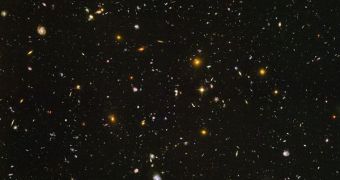Astronomers have puzzled the international scientific community once again by announcing that Earth and its surrounding solar systems may exist in some sort of “bubble,” inside which the flow of space and time is altered compared with the outside world. This contradicts the Copernican principle, which states that our planet does not occupy a special place in space, but rather exists in a solar system like any other. "This idea that we live in a void would really be a statement that we live in a special place," Timothy Clifton, researcher at Oxford University in England, told SPACE.
Until now, astronomers believed that Earth was just a regular planet that happened to be able to sustain life, whereas now they may be forced to conclude that some theories based on the assumption that we are not special may be wrong. In fact, most space-related theories have to pass this principle in order for them to be accepted by the scientific community.
Over the last years, space analysts have argued that the Universe was being propelled by something called “dark matter,” which would have accounted for the way stars on our sky move throughout the known Universe. However, Clifton says that a space-time glitch may offer substantially more data on the way things are observed from Earth. If our planet were to be trapped inside such a bubble, it would mean that time actually passed slower inside, and that light would need much more time to get here than in “normal” conditions.
According to researchers at Oxford, an ultra-low mass density in our solar system may be the cause for distortions. However, until the flow of time and space can't be observed from a fixed observation point, such conclusions can be very difficult to prove. NASA has long since began preparations for a satellite launch, whose mission will be to determine which of the two theories is correct, by observing more than 2,900 supernovae, in terms of brightness and light emissions.
If the lights appear dim, then it would mean that the “Bubble Theory” won, as light would spend significantly more time traveling to Earth than to other places. If the light accelerates and the originating supernova moves farther away, then it would mean that dark matter really exists and that it is indeed the “engine” of the Universe.

 14 DAY TRIAL //
14 DAY TRIAL //